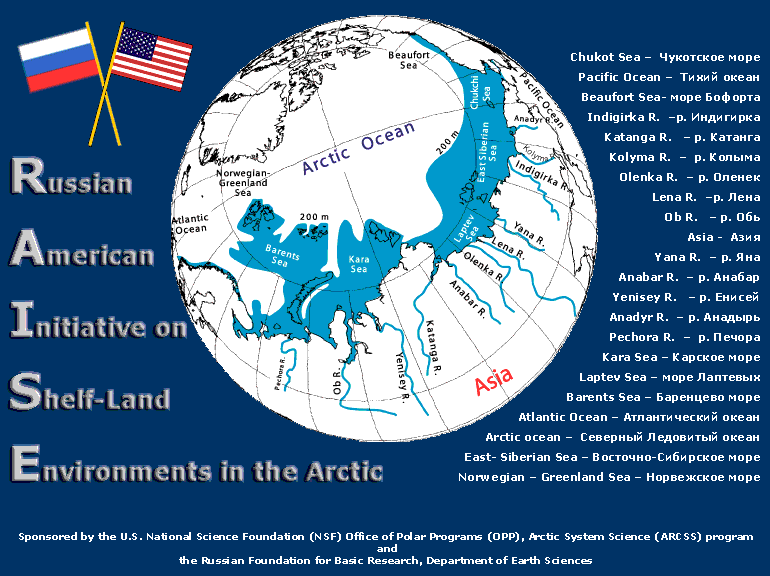|
|
|
|
Objective: To facilitate collaborative research between Russian and American scientists in order to understand processes and events in terrestrial, shelf, and ocean environments in northern Eurasia in the context of a globally changing environment
Program Overview:
RAISE is a multi-disciplinary research initiative that has the objective
of integrating scientific understanding of global change in the Arctic
at the land-sea boundary over prehistoric, historic, and current time
frames. It is focused on the Russian Eurasian Arctic, where the world's
largest continental shelves may play a key role in influencing the scope
of global warming and other environmental changes on regional and global
scales. Among the great unknowns that have been identified are the potential
for release of greenhouse gases such as carbon dioxide and methane from
peat and permafrost as climate warms at higher latitudes. Some of the
largest coastal erosion rates in the world are already occurring in the
Russian arctic, and the ultimate transport and fate of these resulting
large fluxes of organic carbon into the Arctic Ocean are poorly understood.
The volume of river runoff in the Arctic may also be altered by global
change, and changes in the freshwater content of the Arctic Ocean are
likely to have consequences for formation of sea ice cover and thermohaline
circulation over the Arctic-North Atlantic climate system. The retreat
of sea ice over the vast Eurasian continental shelves will also have direct
impacts on biological productivity, as well as higher trophic level marine
mammals and birds, and ultimately, subsistence communities in both Russia
and Alaska that are dependent upon current climate and hydrographic patterns.
These major research problems led to the development of the RAISE program.
These, and other scientific problems were identified during independent,
open scientific workshops held in Russia and the United States that
were supported through the U.S. National Science Foundation and the
Russian Fund for Basic Research. Several independent research programs
involving both Russian and American scientists have already been initiated
in the Russian Arctic, particularly in terrestrial and riverine systems.
A current goal is to develop more consistently and regularly scheduled
U.S. - Russian collaborations on the Eurasian continental shelves. An
international scientific steering committee consisting of both Russian
and U.S. specialists is promoting all of these research efforts, and
a project office, located at the University of Alaska Fairbanks, is
available to provide structural linkages and support for work conducted
under the RAISE framework. View a Powerpoint web overview of the RAISE program, including selected project findings. U.S.-funded projects:
RAISE participates in the International Arctic Science Committee's efforts to improve bilateral, international research in the Russian Arctic through its International Scientific Initiative in the Russian Arctic (ISIRA). One of our contributions to improving the information available for current and prospective researchers in the Russian Arctic has been to identify all current collaborative projects or programs being conducted by U.S. researchers, whether associated with RAISE or not in the Russian Arctic. For the purposes of providing this information resource, links to these non-RAISE projects and projects are also available here. Please contact Lee Cooper with details on new or updated information. View an extended list of Russian-funded projects
RAISE SMO introduction to conducting scientific research in Russia (40 Mb MS Word document) Russian Federation regulations on conducting scientific research in Russia View a flowchart of the request process The Arctic Sciences Section of the National Science Foundation’s (NSF) Office of Polar Programs (OPP) and the NSF Directorate for Geosciences (GEO), in partnership with the U.S. Civilian Research and Development Foundation (CRDF), have established a Cooperative Programs/Science Liaison Office in Moscow. This Office provides on-site support of OPP- and GEO-sponsored cooperative activities in Russia in the geosciences and in Arctic research. Publications:
Science Plan Development:
Currently, work is underway on a bilateral science plan that may lead
to an Announcement of Opportunity for funding of RAISE-oriented research,
particularly at the land-sea margin, and on Arctic continental shelves. If you have comments on, or contributions to, the science plan, or would like to be put on its mailing list, please contact Steering Committee Chair Lee Cooper. The science plan is expected to be completed prior to the 20-23 February 2002 ARCSS "All-Hands Meeting" in Seattle, U.S.A. This meeting will be important for planning the future scope and structure of Arctic system science that is supported by the U.S. National Science Foundation. Additional meeting information is available at http://www.arcus.org/ARCSS/allhands2002/index.html . A presentation
on some aspects of this "Nearshore Initiative," including
the possibility of undertaking research centered around land-sea margin
themes throughout the Arctic was presented by Ken Dunton (Shelf-Basin
Interactions steering committee member, University of Texas at Austin)
and Lee Cooper at the U.S. National Science Foundation ARCSS meeting
held Nov. 14-17, 2001 in Salt Lake City, U.S.A. A bibliography of recent references (last decade) supporting this effort is available for downloading or viewing here in a variety of formats. These scientific references are neither all-inclusive nor will all references be ultimately critical to development of the science plan.
Additional nominations of other papers are welcome; please submit to Lee Cooper. |
|
| Science Steering Committee | Science Management
Office:
Dr. Vladimir Romanovsky Telephone: +1.907.474.7459 |
|
Related Links:
This material is based upon work supported by the National Science Foundation under Grant No. OPP-9818120. Any opinions, findings, conclusions, or recommendations expressed in the material are those of the author(s) and do not necessarily reflect the views of the National Science Foundation. |
|
